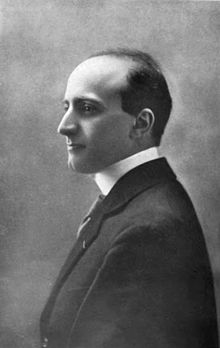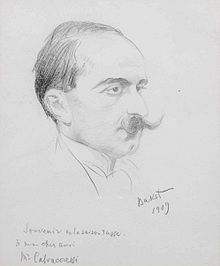Michel-Dimitri Calvocoressi

Michel-Dimitri Calvocoressi (2 October 1877 – 1 February 1944) was a French-born music critic and musicologist of Greek descent who was a British citizen and resident in England from 1914 onwards.[1] His early career was spent as an influential music critic in Paris, until he moved to England to serve in World War I. He was a close friend of both the composers Maurice Ravel and Ralph Vaughan Williams.
Early life and education
Michel-Dimitri Calvocoressi was born in Marseille, France on 2 October 1877 to Greek parents.[2] In his earliest years he learned Greek, Italian, English and later German; he noted that "I read far more English books than French."[3] At the École Monge high school of Paris, he developed a lifelong interest in geology and mineralogy.[3] The musicologist Gerald Abraham notes that Calvocoressi had "a number of false starts at other careers: law, banking and stockbroking".[3] At first, he studied at the Lycée Janson de Sailly, Paris, but inspiration from an Orchestre Lamoureux concert of Richard Wagner's works galvanized his interest in music.[3][a]
Alongside his piano lessons with Eugène Claveau, Calvocoressi frequented the Parisian concert scene, with works by Bach, Liszt, d'Indy, Wagner, and the Romantic Russian composers in particular leaving a lasting impression.[3] He began harmony study at the Conservatoire de Paris with Xavier Leroux, where he became friends with the composer Maurice Ravel;[4] Ravel later dedicated "Alborada del gracioso" from the piano suite Miroirs to Calvocoressi.[5][b] Like Ravel, Calvocoressi was a member of the Apaches music society.[7]
Career and later life

Calvocoressi's music criticism career can be divided into two: a French (1902–1914) and English (1921–1944) period.[8] Described by Abraham as "a remarkable polyglot", Calvocoressi's career beginning in 1902 was as a music critic and correspondent for several English, American, German and Russian periodicals.[4] Encouraged by the novelist Binet-Valmer, the latter introduced him to Octave Maus, an editor of the monthly L'Art Moderne magazine.[3] Calvocoressi became the Paris musical correspondent for L'Art Moderne and music critic for Binet-Valmer's La Renaissance latine magazine; around then he also was music critic for the Anglo-French Weekly Critical Review.[3] Although some of these publications became obsolete in the next few years, Calvocoressi was well established enough to be unaffected.[9]
Calvocoressi published his first book—a study on Franz Liszt—in 1905, the year when he began writing for the English Monthly Musical Record, began both a correspondence with the Russian composer Mily Balakirev and developed a general interest in Russian music, particularly the work of Modest Mussorgsky.[8] From 1907 to 1910 he served as an advisor for the impresario Sergei Diaghilev, who organized Russian music and ballet concerts in Paris.[4] For his efforts, the Russian government granted him the Order of Saint Anna, while the Soviets later elected him a member of the Academy of Sciences of the Soviet Union.[8] He visited Russia for the first and only time in 1914, meeting with musical figures such as Alexander Glazunov.[8] Calvocoressi lectured at the École des Hautes Études Sociales from 1905 to 1914, teaching about contemporary music.[4] He also translated song texts, opera librettos and books from Russian and Hungarian into French and English.[4]
At the onset of World War I, the Greek Calvocoressi found himself unable to serve the French cause. He moved to London and served as a cryptographer.[4] He spent the rest of his life in England, was naturalized, married a British citizen, and wrote the remainder of his books in English.[4] He died in London on 1 February 1944.[3]
Calvocoressi's legacy as a music critic and translator was his advocacy of Russian music. He wrote three books on Modest Mussorgsky and (with his friend Gerald Abraham) Masters of Russian Music (1936). He was the French advisor for Sergei Diaghilev as Diaghilev was introducing Russian arts to the French.[4] After his death Abraham completed and brought to publication both Calvocoressi's Mussorgsky (Master Musicians series, 1946) and his larger study Modest Mussorgsky: His Life and Works (1956).[10]
Writings
- Calvocoressi, Michel-Dimitri (1905). Franz Liszt: Biographique Critique [Franz Liszt: Critical Biography]. Les Musiciens célèbres (in French). Paris: H. Laurens. OCLC 1135190659.
- —— (1908). Moussorgsky. Maîtres de la musique (in French). Paris: F. Alcan. OCLC 3797891.
- —— (1911). Glinka. Les Musiciens célèbres (in French). Paris: H. Laurens. OCLC 1142939.
- —— (1912). Schumann. Les écrits et la vie anecdotique et pittoresque des grands artistes (in French). Paris: Société des éditions Louis-Michaud. OCLC 8641346.
- —— (1923). Charles Koechlin (in French). Paris: M. Senart. OCLC 19949660.
- —— (1923). The Principles and Methods of Musical Criticism. London: Oxford University Press. OCLC 558073283.
- —— (1925). Musical Taste and How to Form it. London: Oxford University Press. OCLC 909990.
- —— (1933). Musicians Gallery: Music and Ballet in Paris and London. London: Faber and Faber. OCLC 2535873.
- ——; Abraham, Gerald (1936). Masters of Russian Music. New York: Alfred A. Knopf. OCLC 926146.
- —— (1944). Debussy. London: Novello and Company. OCLC 1448206.
- —— (1944). A Survey of Russian Music. Harmondsworth: Penguin Books. OCLC 558073294.
- —— (1946). Mussorgsky. London: J. M. Dent & Sons. OCLC 1559285.
- —— (1956). Mussorgsky: His Life and Works. London: Rockliff. OCLC 2048876.
References
Notes
- ^ Calvocoressi's subject of study at the Lycée Janson de Sailly is variously reported in modern sources. The musicologist Gerald Abraham first records that he studied philosophy under André Lalande,[3] but later says it was classics and that he "entered the law faculty but soon abandoned law".[4]
- ^ Ravel later orchestrated this movement in 1919[6]
Citations
- ^ The Concise Oxford Dictionary of Music 2013.
- ^ Jacobs 2002, § para. 1.
- ^ a b c d e f g h i Abraham 1944, p. 83.
- ^ a b c d e f g h i Abraham 2001.
- ^ Huebner 2011, pp. 20–21.
- ^ Kelly 2001.
- ^ Goubault 1984, p. 40.
- ^ a b c d Abraham 1944, p. 84.
- ^ Abraham 1944, pp. 83–84.
- ^ Layton, Robert. 'Abraham, Gerald Ernest Heal', in The Oxford History of National Biography (2004)
Sources
- Abraham, Gerald (March 1944). "M. D. Calvocoressi (1877-1944)". The Musical Times. 85 (1213): 83–85. JSTOR 921571.
- Abraham, Gerald (2001). "Calvocoressi, Michel-Dimitri". Grove Music Online. Oxford: Oxford University Press. doi:10.1093/gmo/9781561592630.article.04622. ISBN 978-1-56159-263-0. (subscription or UK public library membership required)
- Goubault, Christian (1984). La Critique Musical dans la Presse Français de 1870 à 1914 (in French). Geneva: Editions Slatkine. ISBN 9782051005425.
- Huebner, Steven (2011). "Ravel's Poetics: Literary Currents, Classical Takes". In Kaminsky, Peter (ed.). Unmasking Ravel: New Perspectives on the Music. Rochester: University of Rochester Press. ISBN 978-1-58046-337-9.
- Jacobs, Arthur (2002) [1992]. "Calvocoressi, Michel-Dimitri (opera)". Grove Music Online. Oxford: Oxford University Press. doi:10.1093/gmo/9781561592630.article.O004935. ISBN 978-1-56159-263-0. (subscription or UK public library membership required)
- Kelly, Barbara L. (2001). "Ravel, (Joseph) Maurice". Grove Music Online. Oxford: Oxford University Press. doi:10.1093/gmo/9781561592630.article.52145. (subscription or UK public library membership required)
- Kennedy, Michal; Kennedy, Joyce Bourne, eds. (2013) [2007]. "Michel-Dimitri Calvocoressi". The Concise Oxford Dictionary of Music. Oxford: Oxford University Press. ISBN 978-0-19-920383-3.
Further reading
- Gombocz, Adrienne; Somfai, László (1982). "Bartóks Briefe an Calvocoressi (1914-1930)". Studia Musicologica Academiae Scientiarum Hungaricae (in Hungarian). T. 24 (Fasc. 1/2): 199–231. doi:10.2307/901829. JSTOR 901829.
- Maine, Basil (March 1926). "Personalities among Musical Critics. II. M. -D. Calvocoressi". The Musical Times. 67 (997): 216–217. doi:10.2307/912506. JSTOR 912506.
- Maine, Basil (1928). Behold These Daniels: Being Studies of Contemporary Music Critics. London: H. & W. Brown. pp. 8–14. OCLC 2763914.
External links
- The Michel-Dmitri Calvocoressi Manuscripts – Special Collections at the University of Maryland
- Michel-Dimitri Calvocoressi discography at Discogs
